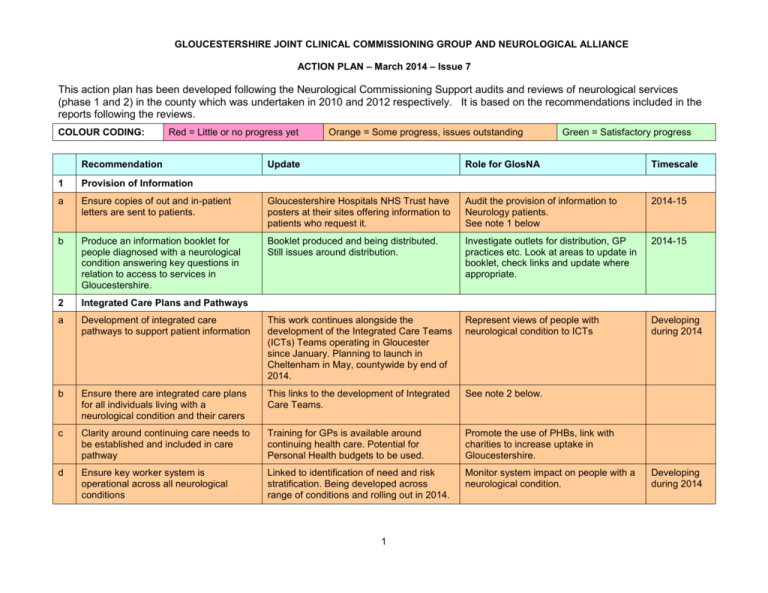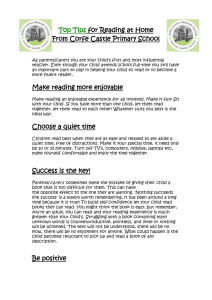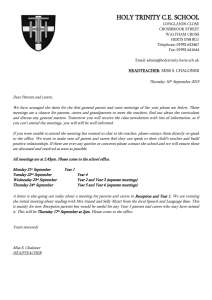Action Plan Issue 7 - Gloucestershire Neurological Alliance
advertisement

GLOUCESTERSHIRE JOINT CLINICAL COMMISSIONING GROUP AND NEUROLOGICAL ALLIANCE ACTION PLAN – March 2014 – Issue 7 This action plan has been developed following the Neurological Commissioning Support audits and reviews of neurological services (phase 1 and 2) in the county which was undertaken in 2010 and 2012 respectively. It is based on the recommendations included in the reports following the reviews. COLOUR CODING: Red = Little or no progress yet Recommendation Orange = Some progress, issues outstanding Green = Satisfactory progress Update Role for GlosNA Timescale 1 Provision of Information a Ensure copies of out and in-patient letters are sent to patients. Gloucestershire Hospitals NHS Trust have posters at their sites offering information to patients who request it. Audit the provision of information to Neurology patients. See note 1 below 2014-15 b Produce an information booklet for people diagnosed with a neurological condition answering key questions in relation to access to services in Gloucestershire. Booklet produced and being distributed. Still issues around distribution. Investigate outlets for distribution, GP practices etc. Look at areas to update in booklet, check links and update where appropriate. 2014-15 2 Integrated Care Plans and Pathways a Development of integrated care pathways to support patient information This work continues alongside the development of the Integrated Care Teams (ICTs) Teams operating in Gloucester since January. Planning to launch in Cheltenham in May, countywide by end of 2014. Represent views of people with neurological condition to ICTs Developing during 2014 b Ensure there are integrated care plans for all individuals living with a neurological condition and their carers This links to the development of Integrated Care Teams. See note 2 below. c Clarity around continuing care needs to be established and included in care pathway Training for GPs is available around continuing health care. Potential for Personal Health budgets to be used. Promote the use of PHBs, link with charities to increase uptake in Gloucestershire. d Ensure key worker system is operational across all neurological conditions Linked to identification of need and risk stratification. Being developed across range of conditions and rolling out in 2014. Monitor system impact on people with a neurological condition. 1 Developing during 2014 Recommendation Update Role for GlosNA Timescale e Develop a single point of access for those with a neurological condition for signposting/advice Will be included in GP contract for 2014-15 and rolled out across Gloucestershire. f Ensure that people with neurological conditions should be identified in GP practice registers. Coverage varies by condition. Links to risk stratification. Specific codes for conditions to be recorded e.g. Parkinson’s. Promote recording of neurological conditions on registers with practice managers. Ongoing g Develop a communication pathway around community hospitals transfers. Links to pathway work and Integrated Community Teams. Aiming to ensure rapid and effective discharge planning across conditions. Monitor and feedback views of people with neurological conditions h Establish a formal process for repatriation and patient transfers to stop people falling through the net. Protocols in place linked to conditions. Monitor cases and raise issues. Ongoing 3 Commissioning Services – Respite Care and Carers a Explore age appropriate day-residential care within statutory funding Scope to use Personal Health Budgets (PHBs) where appropriate. Promote awareness of PHBs 2014-15 b Explore joint commissioning arrangements with local authority to access respite provision within statutory funding. Third sector provision being explored, provided by voluntary sector. c Focus on information in respect of respite for carers, carers’ grants and carers’ assessments. d Ensure that carers are informed of their right to a carer’s assessment and encourage them to ask for this. e Explore the provision of carers counselling and support services 4 Wheelchair Provision a Map problems with wheelchair services and work with the wheelchair service providers to ensure the services provided to people with neurological conditions are delivered effectively. Link with Carers Gloucestershire to publicise GlosNA within Carers newsletter Carers now have a legal right to an assessment of their needs. These are carried out by Carers Gloucestershire. Data on carers assessments now being recorded by Carers Glos Monitor and raise concerns of carers Issues raised at Jan meeting of GlosNA. New manager looking at wheelchair service contract, Hannah Williams. Collect and raise issues from members around quality with the commissioner. See note 3 below. 2 Ongoing Recommendation Update Role for GlosNA Timescale Placements available related to need Monitor and raise issues in relation to placements. Link with charities to gather information. Ongoing Contribute to review of service. Raise issues which come up. System to be reviewed after 6 months The introduction of Advice and Guidance will assist this process, also risk stratification. Link to surgery patient participation fora or locality groups. Ongoing Wide range of activities available in community which can be accessed by people with neurological conditions. Falls prevention classes available which can contribute to improved postural stability. Help to promote availability of classes. See note 4 below. 5 Rarer Neurological conditions a Explore joint commissioning arrangements cross-border to commission services for those living with rarer conditions such as Huntington’s 6 IT System Opportunities a Explore IT systems which could supplement current services to patients and provide professional advice to GPs. Advice and Guidance from the Choose and Book system for Neurology introduced from 1st Nov. gives GPs access to expert advice from consultants. First 3 months data shows slightly increased usage, majority of cases dealt with by GP with advice. b Improve the system to manage follow-up appointments more efficiently. Investigate good practice in other areas. Scope to reduce the number of follow-up appointments where appropriate. c Seek reduction in waiting times to see consultants. Advice and guidance aims to reduce the number of referrals to consultants, so far, from small initial numbers, this is the case. 7 Training a Ensure GPs and frontline staff are fully trained in the recognition of neurological symptoms. Develop a training strategy and co-ordinate the training of generic professionals and GPs in partnership with neurologists and the key local stakeholders including service users and carers 8 Rehabilitation a Look at developing assistive exercise for on-going rehabilitation. 3 Recommendation Update Role for GlosNA b Ensure that people with a long-term neurological condition have access to psychology services. Improving Access to Psychological Therapies (IAPT) programme available to people with a neurological condition, available through 2gether trust. Help to promote services through membership and links to charities. Raise issues. c Develop, through agencies, the provision of vocational rehabilitation Headway reablement project providing support and being evaluated to inform future commissioning models. 9 Transport a Contribute to the county-wide review of transport services and ensure the views of patients with a neurological condition are effectively represented to the review body. GCC reviewing transport. CCG let community transport contract to Arriva. Timescale Ensure links maintained with GCC. Promote community transport and raise issues. Notes 1 It was suggested that Heather Beer, Head of Patient Experience, should be invited to a future meeting at Gloucestershire Hospitals Trust to talk about this issue. 2 The issue of people arriving to assist a person receiving care in their own home was raised as a new issue. In this situation it can be difficult sometimes to establish the name of the care provider, although often there is associated paperwork in the house to identify the provider. Philip Jones – Joint Commissioning Manager, will be invited to the next meeting to talk further about ICTs. 3 If a person doesn't qualify for funding for a wheelchair he or she is not even able to access advice about how to obtain one and the types of chairs available. Hannah Williams is the new contact for the wheelchair contract and will be reviewing the contract during 2014 so will be discussing issues with GlosNA and other interested parties. She spoke about the facility to obtain top up funding from the Barnwood House Trust. 4 In certain areas, e.g. Bristol, funding is provided by local Parkinson’s UK and MS Society groups for specialist exercise courses (including falls prevention). 4






